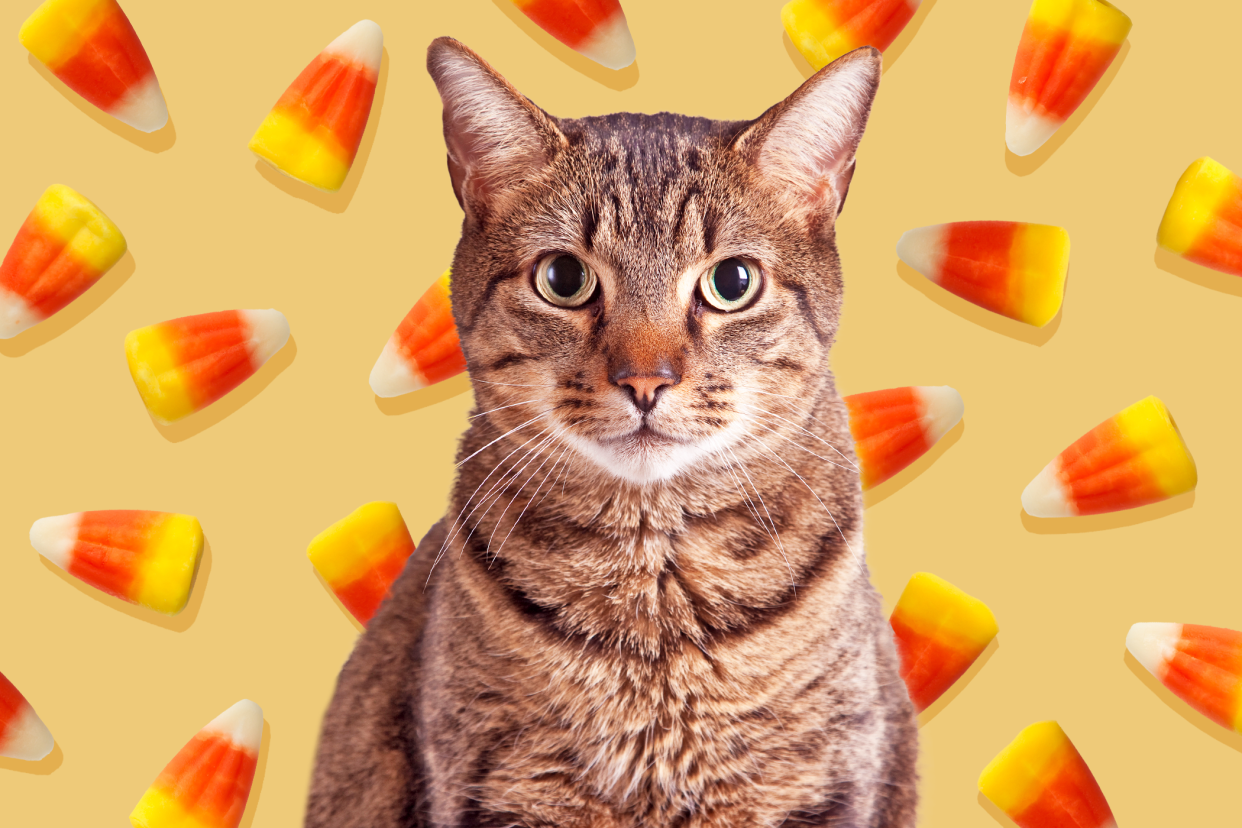Can Cats Eat Candy Corn? What To Know About This Halloween Favorite

mayakova / drbimages / Getty
Cats aren't as likely to be caught with their paw (or chops) in the candy jar as a sweet-toothed pup or family member, but they might find candy corn bewitching enough to have a lick. So, if your cat has a nibble of the other kind of sweet corn, is it toxic?
Cats can eat candy corn (but shouldn't!), says Ginger Watts Brown, DVM, DABVT, DABT, a veterinarian and director at the ASPCA Animal Poison Control Center. But any amount of this sweet treat is likely to give your cat's stomach a fright—in the form of digestive upset. Here's what to do if your cat eats candy corn and what other Halloween scares to watch out for.
Can Cats Eat Candy Corn?
Technically, cats can eat candy corn, but should they? The ingredients typically found in candy corn are a concoction of sugars, oil, and coloring—a far reach from your obligate carnivore's natural diet.
"These ingredients are not normal components of a cat's diet, so they would likely cause varying degrees of vomiting, diarrhea, and increased thirst depending on the amount ingested," Brown says. Whether you love or hate candy corn (we all know there's no in-between), it's best not to share with your feline friend.
RELATED: Can Cats Eat Popcorn?
Is Candy Corn Toxic to Cats?
The ingredients in candy corn are generally considered non-toxic to cats, Brown says. Even sugar alcohols like xylitol, erythritol, and maltitol that are used as artificial sugars aren't toxic to cats (but they are toxic to dogs!).
"Xylitol is a popular sugar alcohol that is very toxic to dogs, causing low blood sugar and liver injury, Brown explains. "When cats eat xylitol, we do not see these severe signs. But xylitol can cause diarrhea in cats, so it should not be purposely fed to them."
If you think your cat has gotten into your bag of candy corn, Brown says to keep a watchful eye on them. Depending on how much candy they ate, they could experience a mild tummy ache to vomiting and diarrhea. If there is continued vomiting, lack of appetite, or if your cat becomes lethargic—seek medical care right away.
RELATED: Cat Poisoning: Causes, Symptoms, Treatment, and Prevention
Is All Candy Bad for Cats?
Let's just say that any candy isn't going to sit well in your cat's stomach, but some candies and other spooky season favorites are more dangerous than others.
If you think your pet has ingested something toxic, experts like Brown are standing by at the ASPCA Animal Poison Control (888-426-4435) or Pet Poison Helpline (855-764-7661) and can help determine if your cat was exposed to a toxic amount of the substance and if a veterinary examination is needed.
Chocolate
While cats tend to enjoy savory treats over sweet ones, Brown says a majority of Halloween calls to the ASPCA Animal Poison Control are related to pets getting into chocolate treats. "Cats that indulge in chocolate candy could be at risk for racing heart, arrhythmias, blood pressure changes, agitation, and in some cases tremors and seizures," she says. "It is important to seek veterinary advice if your cat eats chocolate."
Raisins
We don't actually know why grapes are toxic to pets, but we do know grapes in all shapes and forms (that means raisins, too!) should be kept far from paws reach. Any amount of grape ingestion is thought to cause kidney injury in cats.
Candy Wrappers
It's not just candy that can be dangerous to cats, but the wrappers, sticks, and plastic bags they come with. Swatting at your pile of candy wrappers may look harmless (and cute), but "if these are eaten by a cat, there could be a risk for an intestinal obstruction," Brown says.
Glow Sticks
Just behind the ingestion of chocolate bars, Brown says Halloween also brings an influx of calls about pets chewing on and ingesting the liquid in glow sticks. "Cats are attracted to the glow," Brown says. "When cats bite into them, they tend to froth at the mouth and then run and hide." There's good news: glow sticks aren't poisonous to cats; they just taste really bad. "Tuna juice is a great way to change the taste in their mouth," she suggests. If your cat does manage to get into the glow sticks, monitor their behavior and contact the vet if they aren't acting like themselves.
The bottom line? Keep all the spooky stuff like candy, glow sticks, and other Halloween hazards in a cupboard and out of your furry goblin's curious paws.
RELATED: 8 of the Best Pet Halloween Costumes for Cats or Dogs

